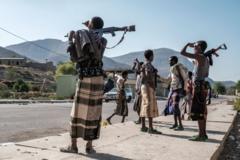Amid the stalled peace talks between Ukraine and Russia, fears persist among Russian exiles regarding returning home, as the implications of ongoing repression and political dissent remain unresolved.
Russian Exiles Express Doubts Over Peace Talks Amid Ongoing Conflict

Russian Exiles Express Doubts Over Peace Talks Amid Ongoing Conflict
Concern prevails among Russian emigrants as cease-fire negotiations falter, raising questions about their future.
In Istanbul, a gathering of Russian expatriates reflects the mounting apprehension surrounding recent peace negotiations concerning the ongoing Russia-Ukraine war. While President Donald Trump has voiced his confidence in Russian President Vladimir Putin to uphold any agreements made, many of those who fled Russia during the early stages of the conflict remain skeptical. The downward spiral of events surrounding the war has left fears unabated, especially as discussions of a potential truce seem to be at an impasse following Putin's dismissal of a proposed 30-day cease-fire from Trump and Ukrainian officials.
"Putin's tenure is the core issue, and the war will cease only when he does," asserted Pavel Snop, a St. Petersburg real-estate agent who sought refuge in Turkey three years ago. This sentiment resonates deeply within the exiled community, reflecting a broader disillusionment with the current regime and its unwillingness to adapt political stance. Many fear that even if some level of peace were to be achieved, the oppressive measures leading to their exodus would persist, prompting continued exile.
As nearly 800,000 Russians have departed since the military incursion began, their absence has left a gaping hole in the marketplace—a consequence exacerbating the nation’s economic vulnerabilities. "We're not just fleeing the draft; we're escaping a political climate that threatens dissent and individual freedoms," a former tech worker expressed during a recent discussion at an Istanbul bookstore founded by another Russian exile.
Resistance among the populace underscores the stark reality of a split society, with many citizens not only opposing the war but also expressing their refusal to participate in it. Hence, the future of these Russian exiles remains ambiguous, as they grapple with the dual weight of uncertain peace prospects and the lingering specter of an unyielding regime back home.






















